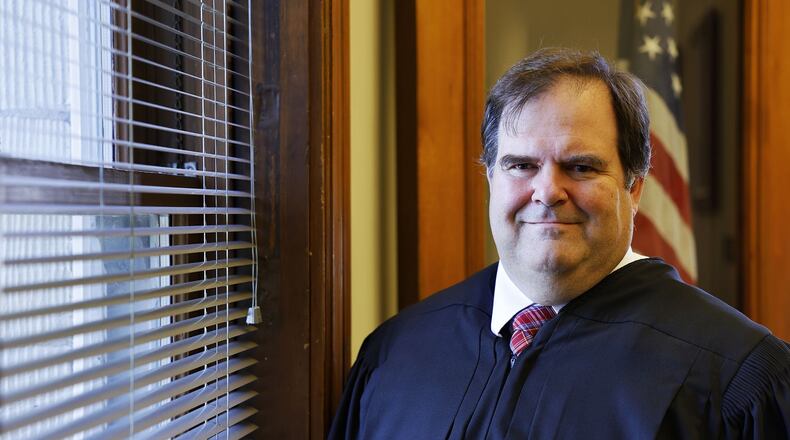There are 23 title clerks who will receive the $1.50 per hour pay bump and 11 managers are receiving $4,000 for a total salary increase of $57,380 this year, paid out of the title not county general funds.
Prior to the raise last year her employees were the lowest paid within the county’s court system, including the municipal courts in Hamilton and Middleton. Chief Deputy Clerk Joe Statzer told the Journal-News he worked with the commissioners’ consultant from Clemans Nelson to gauge the salary landscape within the county and beyond.
“We do tire of losing them to other county offices,” Statzer said. “We feel like we are the Reds and they’re the Yankees, they just take our best players. We had to do this.”
He said they are also losing employees to outside employers — they had a person decide to go and slice meats at a deli recently because the pay was better. It take six to eight weeks to train someone and three to six months “before they really get the hang of it,” so they are losing time investment as well.
He said the clerks are now at the ceiling of the pay range in the contract and they haven’t promised any more increases for the life of the three-year deal.
Holcomb is using $24,500 out of his special revenue fund to give his employees increases to their base salaries. The influx of cash will allow the court to increase base entry level salaries by $2,500 to $34,500. The pay increases are not retroactive. He told the Journal-News his employees were among the lowest paid in the courts.
He said “as a show of good faith” they agreed to use their special revenue funds and are not tapping the general fund. He said they looked at what other courts are paying before they settled on the amount.
“We are trying to reach some kind of parity with the other courts,” Holcomb said. “We’re also looking at the inflation that our employees are facing along with everyone else in terms of what they pay for gas, food and rent. We’re just trying to help them maintain their standard of living.”
They needed the raises now to stave off any more defections to other offices or the outside. He said there was a day when county jobs were coveted.
“I think 10 years ago people would crawl over broken glass to get a county job with retirement and health insurance, even if the pay was low,” Holcomb said. “But that’s not what we’re seeing now.”
In the Juvenile Court the entry level court employee salaries range $19.50 per hour or $35,490 annually for a judicial courtroom clerk to $15.26 hourly or $30,160 for a receptionist. Tim Myers, director of Juvenile Justice Center, said they have recently deployed other enticements to keep their staff onboard, namely letting the clerks work 38 hours a week, giving them one day a month off.
“That is really geared towards retention, for people who are trying to balance life and work we were trying to make that easier for them while still maintaining our efficiency...,” Myers said. “The whole idea was to have us stand apart from other people.”
He said a couple people who left their employ noted they were leaving for “not just money but sometimes maybe a better fit for the balance they’re trying to achieve.”
The Common Pleas Court is the largest with 79 employees and the highest county judicial system starting salaries ranging from $35,500 for office service workers, $44,000 for probation and pretrial officers and $53,375 for judicial assistants and bailiffs.
“We really haven’t had a turnover issue on our court,” Court Administrator Wayne Gilkison said. “We have recently posted we’re trying to hire an office service worker to no avail, but traditionally and this year included we have very little turnover.”
The two courts outside the county system, the municipal benches in Hamilton and Middletown pay their employees the highest countywide. The clerks in Hamilton can make between $39,520 and $49,925 annually.
The Middletown City Council just gave its court clerks a cost of living increase raising their pay from $38,584 to $40,497, the highest starting salary.
The commissioners recently made non-union wage adjustments for employees under their direct control totaling around $220,000. In all 71 employees received raises based on a market update by Clemans Nelson.
County Administrator Judi Boyko said the Domestic Relations Court judges have already asked to meet with her about possible pay increases since the county made the adjustments and she expects other offices may do the same.
“I think there is probably going to be some interest from others to look at their wages and make requests of the commissioners,” Boyko said. “I think the commissioners are not only trying to ensure the county employees are paid equitable to market but also recognize there shouldn’t be this recycling of employees from one office to another if there are like positions. Certainly if someone is qualified for a promotion then yes we want to encourage that growth and development. But I think the commissioners are trying to avoid this recycling of employees to lateral positions.”
In an effort to stop the job-hopping between the courts the commissioners have invited court officials — not the municipal courts — and clerk to a summit to address the issue of parity Holcomb mentioned.
About the Author

